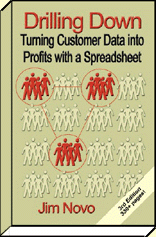|
Thanks for visiting the
original Drilling Down web site! Get
the book at Booklocker.com Customers Speak Up on Book & Site Workshops,
Project Work: Retail Metrics & Reporting,
High ROI Fresh
Customer High
ROI Customer LifeTime
Value and Intro to
Customer Customer
Model: Measuring
Retention CRM
Analytics: Pre-CRM
Testing for See Customer
|
Drilling DownTurning Customer Data into Profitswith a SpreadsheetSite and Book topic: Maximizing marketing ROI with customer behavior analysis
Learn Methods, Metrics |
Drilling Down Newsletter # 13 - October 2001(continued) The custom landing page resulted in higher abandonment (bad), and higher download, bookmark, and subscribe rates (very good, since these stats directly correlate to future purchase of my book) when compared with the home page. This was expected, since the very targeted nature of the custom landing page tends to screen out everybody but the most focused visitors, and for the same reason, drives higher "action behavior" (bookmark, subscribe, download). Did you notice how the stats get better and better as you read from the left to the right of the chart? Scroll up and look at it again. Weird, huh? Almost mystical in consistency. I get better performance from natural search traffic than I get from driving highly targeted (and paid for) traffic to the generic Home Page. And "natural" Google traffic is even better than "All Search" engine traffic. This makes me wonder - do the different engines really deliver traffic all that different in quality? Google is a bit of a strange bird, because it is currently a media favorite and never got into the "portal" business. What about all the other search engines? Here's what the "action behavior" (behavior leading to book purchase) stats look like on the rest of them, in order of the percent of traffic they deliver to my site. Note: In the next table, "Yahoo" excludes Google default pages.
Note: In the next table "Lycos" excludes Hotbot
Hmmm. Sure are different, aren't they? There's frequently a difference of double or triple in the same metric across the engines. But traffic also matters. FAST delivers great overall stats but hardly any traffic, so I should probably look into what is going on there. And I will. Fortunately, you will be spared the results,
as this is the promised end of the series on analyzing web
logs. What did we learn? Questions from Fellow Drillers A: Aw, shucks. Thanks for the kind words. Q: I would like to know your opinion as to how this approach could be modified suitably for implementation in a Software Development and IT outsourcing firm like mine. A: Generally, any transactional activity can be profiled using the RF scoring method. It is used for everything from predicting the likelihood of someone to commit another crime to predicting the likelihood of someone to make a bank deposit. RF is based on human psychology and is therefore applicable in any culture. Any part of your business where transactions are generated - medical transcription, attendance records, project tracking, and so on. All you have to do is think of situations where the prediction of repeat behavior likelihood is desirable. In some cases, frequently in service businesses, the desired outcome is inverted - that is, it is positive if people become less likely to do something. For example, in regards to attendance tracking, if you want to predict the likelihood of a person to skip or call off work, look at the Recency and Frequency of this past behavior. If you were using RF scoring, a falling score for the person would be positive, since they are becoming less likely to call off again. In transcription, for monitoring coding errors, the higher the Recency and Frequency of past errors, the more likely they are to be committed again. A falling RF score for a transcriber would be positive, since they are becoming less likely to commit another error. A rising score, they are becoming more likely to commit an error. I don't know if likelihood prediction is useful for the transcribed records themselves, but it could be. For example, predicting the likelihood of a doctor to prescribe a certain medicine or order a certain procedure. The tracking of these things might be useful to a client and you could offer this as an added service to them. As far as software development for clients, there are any number of situations where a simple predictive model may be useful, especially where there is transactional activity related to purchases in B2C and B2B - reordering / replenishment for trading hubs, for example. And of course, in CRM, there are many, many uses for simple predictive behavior models. Generally, one should try using the RF scheme for prediction
before any more complex modeling operations are carried out. Often, after a long and torturous data mining project is
completed, one finds Recency and Frequency to be the primary
variables predicting the behavioral outcome; much time and
effort could have been saved by using the simple RF
scoring process detailed in my book in the first place!
If you would like me to teach you these concepts using your
own business model and customer data, check out my
workshops and project-oriented service: Customer
Consulting. Any comments on the newsletter (it's too long, too short, topic
suggestions, etc.) please send them right along to me, along with
any other questions on customer Valuation, Retention, Loyalty,
and Defection to me. Get the book with Free customer scoring software at: Booklocker.com Amazon.com Barnes & Noble.com Find Out Specifically What is in the Book Learn
Customer Marketing Models and Metrics (site
article list) |
|||||||||||||||||||||||||||||||||||||||||||||||||||||||||||||||||||||
